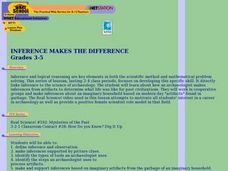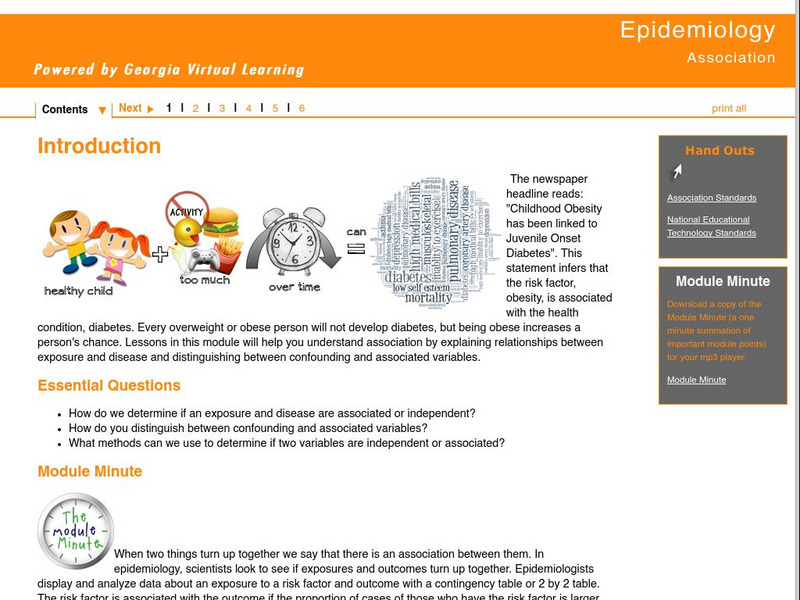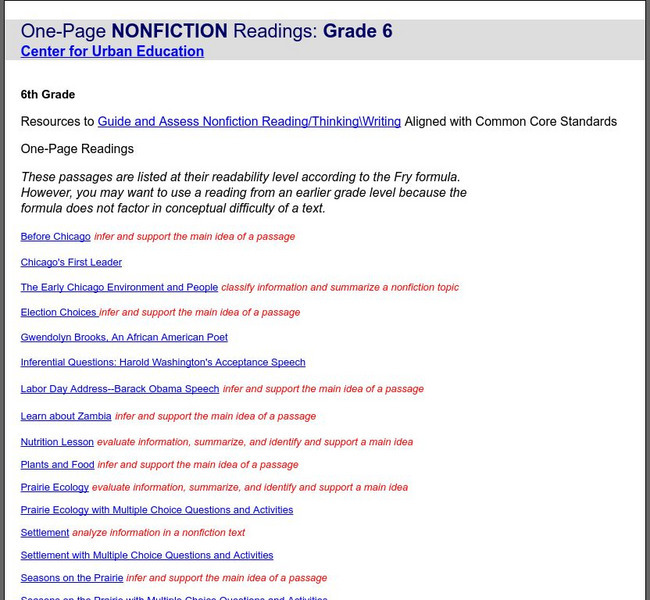Curated OER
Sunny or Shady?
Students practice answering questions to aid in creating meaning when reading. Through guided practice, they read a passage from the chapter book "Tuck Everlasting" and answer in-text and inference questions. Independently, they read...
Curated OER
Deep or Shallow
Third graders practice answering questions to aid in creating meaning when reading. Through guided practice, they read a passage from a chapter book and answer in-text and inference questions. Independently, they read another chapter...
Curated OER
Scientific Thinking
Students participate in four different activities which reinforce an understanding of they way scientists think about the world. They make careful observations of two different pennies, write the procedure for making a peanut butter and...
Curated OER
Observation vs. Inference
Student observe two cups, one slightly smaller and skinnier than the other, with one put inside the other. The cups are turned upside-down and the smaller one is caught as it falls out of the larger cup. The larger cup is filled up about...
Curated OER
Predict, Draw Conclusions
Students discuss times they predict what will happen next. They compare this to using the information given in a piece of literature to predict what will happen next in the story. Students listen as the teacher reads an excerpt from The...
Curated OER
Language Arts: Guided Reading with Fancy Dance
Students participate in a guided reading of Leslie Johnson's, Fancy Dance and discover how to sequence events. This lesson stresses word recognition, suffixes and prefixes, and sentence structure. Cross-curricular activities involve art,...
Curated OER
Archeology: Weapons of the Texanos
Students develop archaeological context skills through a simulation which places them in the year 2500. After listening to the teacher read, "Weapons of the Texanos," they record what they think the weapon is. Next, in groups, they...
Curated OER
Inference Makes the Difference
Students explore how archaeologists make inferences from artifacts to explore what life was like in the past. In this archaeology activity, students work in groups and make inferences about an imaginary household based on modern day...
Curated OER
Get the Joke!
Middle schoolers explore humor through word context and inference used in everyday language.
Curated OER
Plastics and Rubber: What's the Difference?
Learners observe how to classify things into groups based on physical properties. In this plastic and rubber instructional activity students group and sort items to help them to better identify properties.
Curated OER
Cool! Awesome! What is it?
Students infer what a mysterious object is in a photo. In this inference activity, students practice their scientific skills to identify what they see. Students enjoy solving the mysterious identity of objects and extending their...
Curated OER
Birds and Birdfeed
Fourth graders examine the basic survival needs of birds before examining a suet ball as an example of what birds eat. They conduct an experiment with pine cones, bird seed, vaseline, and peanut butter. By observing the birds, they...
Curated OER
Are We Alone
Seventh graders collect/analyze data and draw conclusions; support reasoning by using a variety of evidence; construct logical arguments; access information at remote sites using telecommunications; apply the concept of percent;...
Curated OER
Wig-wag Physics
Young scholars make observations on the effects of a small, medium and large weight on the movement of a wig-wag apparatus. They use their observations to develop a generalized inference of the effect weight on movement patterns.
Curated OER
Physical Properties of Ice
Students demonstrate that ice melts faster under pressure. They recognize that ice can be broken up or melted by pressure and then refreeze.
Georgia Department of Education
Ga Virtual Learning: Association
The lessons in this comprehensive interactive module will help you understand relationships between exposure and disease and distinguishing between confounding and associated variables.
Science Education Resource Center at Carleton College
Serc: Investigating South Crow River: Discharge, Turbidity, Erosion, Sediments
In this field investigation, small groups of students will observe and measure characteristics of the South Crow River near Mayer, Minnesota. Data collection on these characteristics will include but not be limited to: speed of current...
Polk Brothers Foundation Center for Urban Education at DePaul University
De Paul University: Center for Urban Education: Comprehensive Questions: Nonfiction [Pdf]
Questions are provided to help students determine the main idea, topic, and fact versus opinion of a nonfiction piece. Students are prompted to write a summary of an informational text.
Other
The Critical Thinking Consortium: A Teacher's Guide to the Gardener [Pdf]
The Gardener by Sarah Stewart won the Caldecott Honor in 1998. It centres around a set of letters about a young girl who moved from the countryside to the city. In the lessons in this teaching guide, students must make inferences from...
Other
The Critical Thinking Consortium: A Teacher's Guide to the Three Questions [Pdf]
A study of The Three Questions by Jon J. Muth will have students critically examining the text as they exercise their higher order thinking skills. This excellent teacher's giide comes with blackline masters and an assessment rubric.
National Institutes of Health
Alcohol: Separating Fact From Fiction
Students can use this site to observe the effects of alcohol on mice and discuss the ways in which alcohol harms and impairs the body. An online instructional activity, "Alcohol; Separating Fact From Fiction," has students watch video...
Other
Peoples Education: Make Inferences in Science [Pdf]
This online textbook selection focuses on how scientists make inferences from evidence. Students are given a reading passage about underwater exploration and are asked to make inferences based on the text. The passage is followed by...
Polk Brothers Foundation Center for Urban Education at DePaul University
De Paul University: Center for Urban Education: One Page Nonfiction Readings: Grade 6
This site contains 17 nonfiction articles that are appropriate for students with a 6th grade reading level, as measured by the Fry Formula. Questions for each passage are provided. Graphic organizers are available for these copyrighted...
Texas Education Agency
Texas Gateway: Question and Purpose
This tutorial reviews over making observations to form questions and purpose for a lab experiment.



















![De Paul University: Center for Urban Education: Comprehensive Questions: Nonfiction [Pdf] Unknown Type De Paul University: Center for Urban Education: Comprehensive Questions: Nonfiction [Pdf] Unknown Type](https://d15y2dacu3jp90.cloudfront.net/images/attachment_defaults/resource/large/FPO-knovation.png)

